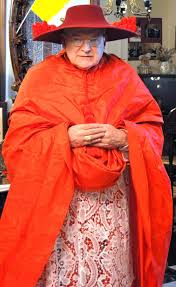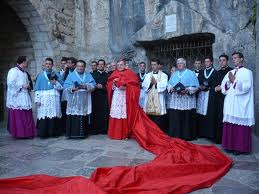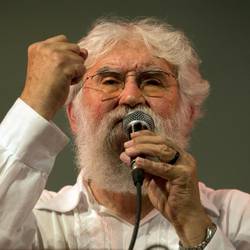


 Bhutans 33-årige kung Jigme Khesar Namgyal Wangchuk med sin drottning Jetsun Bema
Bhutans 33-årige kung Jigme Khesar Namgyal Wangchuk med sin drottning Jetsun Bema
Syster Joan Chittister har varit på studiebesök i Bhutan och studerat vad ”Bruttonationallycka” innebär.
Läs hennes intryck i NCR från det lilla kungadömet inklämt mellan Indien och Kina högt uppe i Himalaya och varför världens blickar alltmer riktas dit.
”Bhutan is a country so small — fewer than 1 million people live there — that, tucked between China to the north and India to the south, it is very easy to miss. But this little country is having more and more impact on the rest of the world every day.”
”In Bhutan, the national emphasis is on sustainable development, the preservation of cultural values, the conservation of the natural environment and the establishment of good governance — governance that puts human well-being and happiness before business, productivity or rugged individualism. And it’s not mere sloganeering.”
”The theme is constant: Life is for human service, not financial profit. The citizen does what the country needs, not what globalism demands.”
”Do they have problems with all of this? Yes, they do, and they know it. They have refugee problems that arise out of citizenship responsibilities. They have technology problems that create age gaps in the family. They have issues of balance in a society that is balancing one world against another. So they are fashioning an educational system to integrate the principles of GNH into everything they teach. In order to ensure these ideals will shape their future as well as their present, they must all be faced, all be resolved.”
http://ncronline.org/blogs/where-i-stand/bhutans-model-gross-national-happiness-glorious-goal-modern-society
// Irène
PS Jag besökte själv Bhutan i höstas med en grupp under ledning av professor Antoon Geels och vi fascinerades alla av det annorlunda lilla landet där alla invånare går klädda i ”nationaldräkt” till vardags och som förstahandsalternativ vid psykiskt illamående går till astrolog istället för psykiatriker.
Med på resan var också Agneta Lagercrantz SvD som skrev så här.
”Bruttonationallycka – något att tänka på också här, kanske?”
http://blog.svd.se/idagbloggen/2013/03/20/forsta-internationella-lyckodagen/
Kolla på video om Bruttonationallycka
http://sv.wikipedia.org/wiki/Bruttonationallycka



















2 svar till ”Att evangelisera i den institutionella kykan”
Tack Krister!
En mycket viktig intervju som förtjänar att bli läst i sin helhet. Men här är ett citat som jag tycker är centralt:
”What motivates the ”Call to Disobedience”and all of this organization by priests in Austria?
The priests in Austria have realized that after we retire, our communities will be merged. The priest shortage is an urgent, desperate situation. The lay members of our communities are the ones who are building up the church. The more parishes merge, the more that priests are losing the chance to walk with members of their communities through their daily lives. This is about more than compassion. It is about companionship and solidarity with laypeople. Life is not going to get any easier, and we want to offer people the service of the church.
Our second motivation comes from the questions that have arisen out of our pastoral care of our parish communities. The church’s doctrines on divorced and remarried Catholics and same-sex couples have created a lot of pastoral problems. We need a new teaching model on sexual relations. Our teaching should concentrate on the quality of relationships, not the form. Rather than condemning remarried Catholics or same-sex couples, we should be asking: How are they living in relationship? Are they respecting one another’s dignity? We have to respect that people want to live together, that they feel responsible for one another, and that they care for one another.”
Gert
Gert, alla
Ja, intervun är så mångsidig och värd att läsa noga i alla sina delar, nästan ett brott att bara
plocka ut vissa godbitar! Men jag gör gärna det också!
– Some have claimed that the Roman Catholic church in Europe is either dying or being replaced by secularism. How do you respond to those claims?
Because of the history of reformation in Europe, the church has had to seriously engage with modern society. This doesn’t mean the church is dying. It is simply struggling with the questions of modernity. Yes, some faith communities are small, but they are very active.
We are confronting the questions, not giving in to secularism. Some want a ”contrast church” that is contrary to society. But that’s not the idea of Jesus or the Gospels. The church should go into society and share the daily lives of the people.
– Do you think Europe needs to be evangelized?
If evangelization means that the Gospel has to be brought from ”us” to ”them” and that ”they” have to accept that we [the hierarchy] have the wisdom, then I think there will not be success with the new evangelization. The first evangelization that is needed is the evangelization of the church.
—
Evangelization has to meet the people, to understand their questions, to understand changes in society, to respect that this modern society has realized a lot of originally Christian ideas, and to find again the origin of our Gospel.
If the new evangelization should become a monologue, there will be a problem. Yes, we have to preach the Gospel, but we must bring it in the language of our time. That’s not watering down the Gospel, but coming into dialogue with world about the Gospel.
– What do you think of the claim that we are living in a ”culture of death”?
The Second Vatican Council had an optimistic view of modern society. There was no talk of a culture of death. The bishops respected the successes of human society. Of course, Gaudium et Spes recognized that modern society has its darkness, chaos and conflict, but it also recognized that modern society developed the ideas about a fair and just society, about the equal participation of human beings, and the right to individual conscience. This really is the spirit of the [United Nations’] Declaration of Human Rights, and the council respected it.
Mater et Magistra made the point that the church’s position is not to look down on society and say it is dying, but rather to look at what is good in society and discuss what is problematic. The church should be a good companion to modern society. Of course, this is risky. It’s more comfortable to be in a fortress. But the way of Jesus is to go with the people wherever they are.
—
– What about the hierarchy’s claim that you are creating disunity in the church?
In these conversations, we are gathering people here who are engaged in this church. They have discussions with me and one another, and then they return to their communities and continue their work for the church. We are not driving them out of the church; we are inspiring them to continue to ask for reform. It is their church. If the bishop could see who the people are who are gathering here, they would not be afraid that we are dividing the church. I think the contrary is happening. I have had people say to me: ”I would have left, but after hearing you, I feel there is some hope in fighting for the church and its reform, so I will stay.”
– What are the first steps you would like to see the pope and the bishops take in bringing about reform?
One of the important steps would be to encourage the bishops to be with the people, not to be against them in the name of the Vatican. A key move will be to decentralize papal authority and to call the bishops to collegiality and shared responsibilities. The bishops’ synod must function like a real synod. It’s the only way to give the bishops the possibility of filling the space with new ideas. Also, laypeople must be brought into the church’s decision-making. We must put pressure on church leaders to open dialogue and to use the gifts and charisms of the faithful.
/Krister